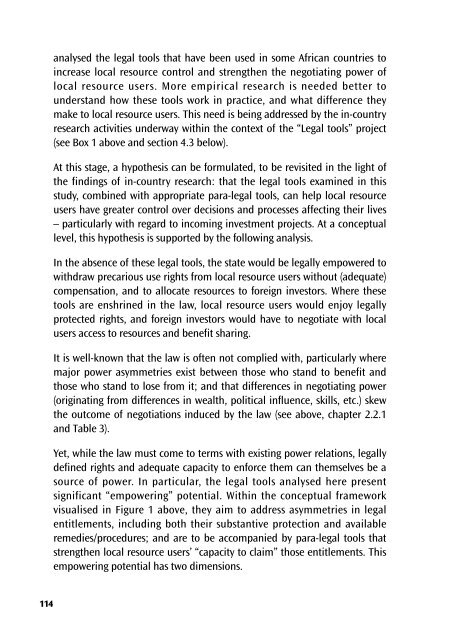Legal empowerment for local resource control
Legal empowerment for local resource control
Legal empowerment for local resource control
You also want an ePaper? Increase the reach of your titles
YUMPU automatically turns print PDFs into web optimized ePapers that Google loves.
114<br />
analysed the legal tools that have been used in some African countries to<br />
increase <strong>local</strong> <strong>resource</strong> <strong>control</strong> and strengthen the negotiating power of<br />
<strong>local</strong> <strong>resource</strong> users. More empirical research is needed better to<br />
understand how these tools work in practice, and what difference they<br />
make to <strong>local</strong> <strong>resource</strong> users. This need is being addressed by the in-country<br />
research activities underway within the context of the “<strong>Legal</strong> tools” project<br />
(see Box 1 above and section 4.3 below).<br />
At this stage, a hypothesis can be <strong>for</strong>mulated, to be revisited in the light of<br />
the findings of in-country research: that the legal tools examined in this<br />
study, combined with appropriate para-legal tools, can help <strong>local</strong> <strong>resource</strong><br />
users have greater <strong>control</strong> over decisions and processes affecting their lives<br />
– particularly with regard to incoming investment projects. At a conceptual<br />
level, this hypothesis is supported by the following analysis.<br />
In the absence of these legal tools, the state would be legally empowered to<br />
withdraw precarious use rights from <strong>local</strong> <strong>resource</strong> users without (adequate)<br />
compensation, and to allocate <strong>resource</strong>s to <strong>for</strong>eign investors. Where these<br />
tools are enshrined in the law, <strong>local</strong> <strong>resource</strong> users would enjoy legally<br />
protected rights, and <strong>for</strong>eign investors would have to negotiate with <strong>local</strong><br />
users access to <strong>resource</strong>s and benefit sharing.<br />
It is well-known that the law is often not complied with, particularly where<br />
major power asymmetries exist between those who stand to benefit and<br />
those who stand to lose from it; and that differences in negotiating power<br />
(originating from differences in wealth, political influence, skills, etc.) skew<br />
the outcome of negotiations induced by the law (see above, chapter 2.2.1<br />
and Table 3).<br />
Yet, while the law must come to terms with existing power relations, legally<br />
defined rights and adequate capacity to en<strong>for</strong>ce them can themselves be a<br />
source of power. In particular, the legal tools analysed here present<br />
significant “empowering” potential. Within the conceptual framework<br />
visualised in Figure 1 above, they aim to address asymmetries in legal<br />
entitlements, including both their substantive protection and available<br />
remedies/procedures; and are to be accompanied by para-legal tools that<br />
strengthen <strong>local</strong> <strong>resource</strong> users’ “capacity to claim” those entitlements. This<br />
empowering potential has two dimensions.

















